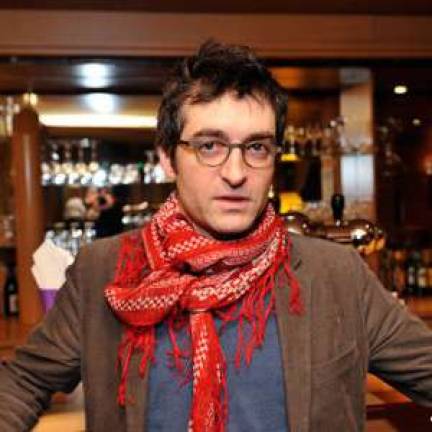By Gregory Solman The son of the late French filmmaker Jacques Demy (Lola, The Umbrellas of Cherbourg) and his formerly estranged wife Agnes Varda (Far from Vietnam, The Gleaners and I), Mathieu Demy sees his first directorial feature Americano as a riposte to his mother's 1981 film Documenteur: An Emotion Picture. One of Varda's many semiautobiographical/fictional conceits-the title translates "docu-liar"-enlisted Demy as a nine-year-old actor playing the son of a woman trying to start her life over in Los Angeles after a tumultuous breakup. Demy, who was in a sense that boy in reality, mixes the movie mythology of his father's romantic Nouvelle Vague masterpieces with his own turbulent relationship with his vagabond mother and enigmatic father. It's a journey worth following. I expected to see the influence of your parents, but I saw Wenders. Paris, Texas, was definitely an influence. It's one of my favorite films ever and an inspiration for Americano, definitely. Obviously, I try to put in references, winks, inside jokes, and in that state of mind as an audience, you get caught up in that game and find stuff not intended by the director. I just wanted to put iconic imagery, connections to films that I loved as a child. They are not necessarily understandable to get the story, but it's something else on top of the story you can have fun finding. Walter Hill, who was a friend of your father, told me that Jacques Demy believed American directors had discovered a secret-that the ideal length of a feature is 85 minutes-then they'd lost it. I've never heard that. At 105 minutes, I missed the point, I'm fucked! In a way I agree and don't really agree. When it comes to time perception, what's so fascinating about time and so fascinating about memory, is that it's not equal. I didn't get bored a second watching Titanic at 3 hours 20, and I recently watched a one-hour film that seemed to be a year. When it comes to traditional storytelling, I think this is pretty smart, it's true. But then again, the perception of time is so different from one person to another. But as a filmmaker it seems you applied a certain discipline to the construction of scenes. When I was editing, my perspective was that I have to make it as short as possible without hurting the feel of the film. If I could have made it 85 minutes, I would have loved to, but it would have damaged, a little bit, that sort of mellow feel I wanted. I wanted people to dream about other films to get into those reference, escape a little bit, because that's the sort of film it is. Were you influenced by the Nouvelle Vague or the rive gauche group, or did you feel unconstrained about adopting American influence? Unconstrained. I knew that I wanted to make a film that fit my influences, which are not only French, or new wave because of my parents. You mentioned Wenders, Jacques would show me Westerns-Rio Bravo, Shane, Johnny Guitar-and American musicals and his musicals? Umbrellas of Cherbourg and Gene Kelly? Yes. And Disney cartoons, lots of Disney cartoons. And I wanted to put all those influences of the films I love, have them there, because Americano is really a film about my childhood, and related to Documenteur-being an actor in my mom's film, and also related to the films that Jacques would show me as a kid. A Belgian journalist said I was "avant premier film," before your first film. That was pretty smart. Because if I hadn't the ambition to talk about where I'm coming from, the style would probably have been different. I'd like to hear more about the cinematheque run by your parents. They felt that as parents, the best thing to do was to show what they like, and afterwards, let me see whatever I want. Those 16mm films they would show me at the family house on the West coast of France in the summer when I had a school vacation. It would include mostly Jacques's films, but also Jean Vigo's L'Atalante, Pickpocket (Bresson), Singin' in the Rain, the Westerns I mentioned, Max Ophuls and Hitchcock, The Birds and Psycho. As a cinephile, I was happy to discover that you referenced the myth of Lola without feeling the need to demystify it. In the end, Lola has to remain a mystery, don't you agree? Absolutely. She's a fantasy. She doesn't exist. To read the full article at CityArts [click here. ](http://cityarts.info/2012/06/14/the-cityart-interview-mathieu-demy/)

